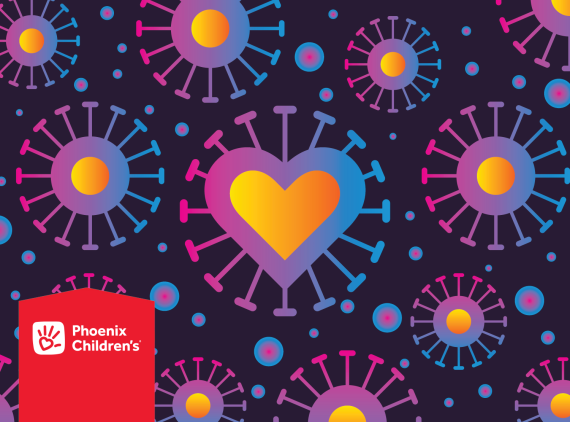UPDATE
As experts learn more about COVID-19, a growing number of pediatric clinicians and researchers are looking at the links between COVID-19 and Kawasaki Disease, a pediatric multi-system inflammatory condition, which, at its most dangerous, can seriously impact a child’s heart. Read the latest on this disease and how Phoenix Children’s Heart Center is prepared to diagnose and treat this. Also, you can watch a video from Josh Koch, MD, division chief of the Phoenix Children’s Cardiovascular Intensive Care Unit.
There is very little known about the impact of COVID-19 infection on patients with congenital heart disease (CHD). The Center for Disease Control (CDC) reports that the common underlying conditions among the hospitalized pediatric patients in the USA include chronic lung disease (including asthma), cardiovascular disease, and immunosuppression.
We recently sat down with Phoenix Children’s Heart Center cardiologist, Dr. Deepti Bhat, to ask her the most frequently asked questions from our heart community around COVID-19 and CHD.
Are children and adults with congenital heart disease (CHD) at high risk for severe complications of COVID 19?
Healthy kids and adults with repaired congenital heart defects (CHD) may not be at any additional risk for severe illness with COVID-19. However, a few areas of CHD could be potentially higher risk based on past epidemics, like SARS:
- Single ventricle patients (such as Hypoplastic Left Heart Syndrome)
- Infants less than 12 months of age with CHD
- Children and adult CHD patients with pulmonary hypertension
- Patients with unrepaired complex CHD and those with cyanosis (oxygen saturation less than 85%)
- Heart transplant patients
- Children with CHD along with other chronic illnesses (lung disease, kidney disease)
- Patients with or without CHD requiring medications to improve their heart function (such as cardiomyopathy)
- Patients with genetic disorders potentially associated with compromised immune systems (such as Down Syndrome, DiGeorge Syndrome)
Should I come for follow up visits with my cardiologist for ongoing management of my CHD during the COVID pandemic?
Patients with repaired or unrepaired CHD are at risk for developing complications. It’s very important you continue with your routine follow up as recommended by your cardiologist. The Phoenix Children’s Heart Center continues to support you and your child with CHD during this pandemic, while minimizing your exposure to COVID infection. We are currently scheduling telephonic and video visits (telemedicine) for our patients, and limiting the cardiac testing and in person visits only for urgent evaluation. We continue to provide full-time inpatient coverage for our cardiac patients and our clinic at the main Heart Center and few designated satellite clinics remain open for urgent testing and evaluation.
What should I do if I’m pregnant with a fetal diagnosis of possible CHD?
Our fetal cardiology team is available to provide urgent counseling and care of our pregnant patients. Data suggest pregnant women may be at higher risk for severe illness from COVID-19. The CDC reports few cases in babies born to mothers who tested positive for COVID-19 during their pregnancy, however, at this time, it’s not clear if COVID-19 can be transmitted via the placenta or breast milk. Please contact the Phoenix Children’s Fetal Care Center (phone: 602-933-4411) to discuss your upcoming fetal cardiology consultation and any concerns.
What about adult CHD patients?
Our adult CHD patients with aforementioned conditions are also deemed to be at slightly higher risk for severe illness from COVID-19. The guidelines for personal protection, COVID-19 symptoms, follow-up with cardiology and continuing prescribed cardiac medications are applicable to these patients. Our adult congenital heart disease (ACHD) outpatient and inpatient team is available for our patients and the routine clinic visits are being offered via telemedicine. If you’re adult with CHD and have symptoms of COVID 19, please contact your primary care physician and your cardiologist to get up-to-date information regarding testing and resources.
Should I continue to take cardiac medications prescribed by my doctor?
Yes. Concerns have been raised about the impact of certain medications like ACE-inhibitors and Angiotensin Receptor Blockers (ARBs) on COVID-19 infection. There’s no confirmed evidence of this association but stopping these medications abruptly can cause worsening of cardiac symptoms.
How do I minimize mine and my child’s risk of infection?
Currently, there is no vaccine to prevent COVID-19 and there are no proven effective treatments or medications other than supportive care. The best way to prevent illness is to avoid being exposed to the virus which is spread mainly from person-to-person (via close contact), through respiratory droplets, and in some instances, from asymptomatic patients. Follow the current CDC and Arizona Department of Health guidelines for social distancing, avoid non-essential travel and public places, use facemasks (even homemade) when in public, practice good handwashing (for a minimum of 20 seconds), and avoid patients with respiratory symptoms.
What are the signs of COVID 19 in children and young adults?
Children generally appear to have milder symptoms from COVID 19. Analysis of pediatric patients from the USA shows the most common symptoms in children include fever (56%), cough (54%) and shortness of breath (13%). Data also shows that some children may not have any fever or cough from the disease, and therefore infected children can be an important source of disease transmission to their close contacts.
What should I do if I or my child with CHD shows signs of COVID 19?
If you or your child have a cough or fever, call your physician’s office (or call Phoenix Children's COVID-19 Hotline at 602-933-0908). If the patient has only mild symptoms, you may be advised to stay at home and not visit an emergency department or urgent care clinic. If the symptoms do not improve or worsen, seek medical attention at any of our Urgent Care facilities.

